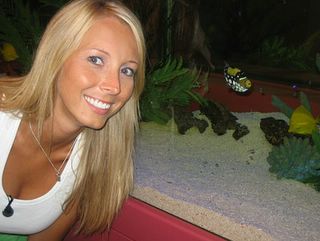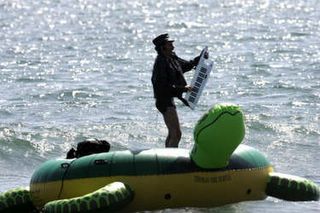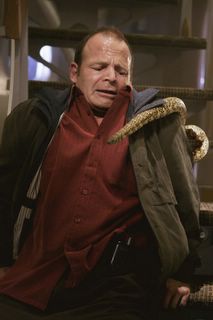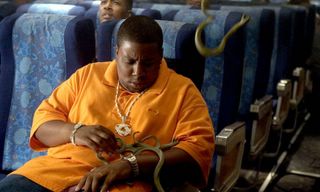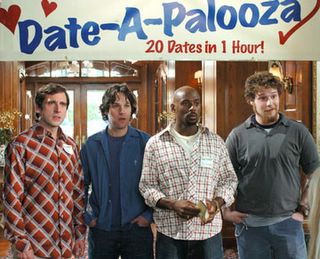[NOTE: I will be totally giving away what happened in this week's series finale of "Six Feet Under." If you haven't watched it yet, you probably aren't a fan of the show, and therefore don't care. If by some strange chance, you haven't watched the show and DO CARE what happens, I suggest you purchase a DVR system immediately for your home to avoid this unfortunate situation in the future.]
"Six Feet Under" was basically my favorite show. I had to watch it all the time at my previous job, providing subtitles for HBO DVD releases. I'd have to see each episode at least two or three times all the way through to do my job, and sometimes I'd have to spend a while going through an individual scene, so I'd be watching it even more. I got to know the show very well (also, "Sex and the City," "The Sopranos," Season 1 of "Carnivale" and, unfortunately for me, "Arliss.")
Now that it's over, I can say with confidence it was the best drama on television. Yes, I liked it more than "The Sopranos," although it's kind of close. I can also say that this final fifth season wasn't the best. I'd go with Season 2 as best overall, what with Brenda's sex addiction and Nate's brain illness and all...plus, no babies or kids.
So, yeah, from just that little description, it's obvious that "Six Feet Under" was basically a soap opera at heart. It introduced a bunch of likable characters and then proceeded to hurl shit at them in an endless stream for five years running, always allowing them to spiral out of control just enough to make the resolution cathartic, but not so much as to scar them permanently.
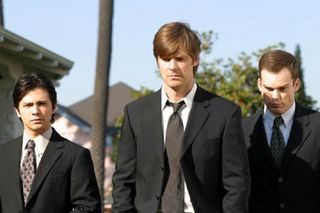
What sets it apart from other soap operas, and made me like it, was its sarcastic side. This is, after all, a creation from the man who wrote American Beauty. Alan Ball takes particular delight in dissecting the flaws and weaknesses hidden beneath the surface of suburbia, so a show about funeral directors in Los Angeles was basically a perfect fit.
"Six Feet Under" was a hugely moral show with no God. Every week, the Fisher family was confronted by the big issues of life and death, and had no religion or simple philosophy to turn to. Imagine if the Walton family were atheists. Or those bitches on "Touched by an Angel." Each week, desperate people turn to our heroes for help, and what do they have to offer? Not the comfortable homilies of the Psalms or a softly-spoken and quickly-answered prayer, but an eternal void of nothingness, a Superman-esque Forbidden Zone, that greets us all when we die.
Every "Six Feet Under" episode had conversations occuring for no Earthy reason. People in pain, in grief, they babble (or so Alan Ball would have us believe...honestly, I don't have enough experience with funeral settings to know for sure). And the Fishers would have to listen, because they're there. Because they don't have the luxury of dying and not having to press on, day after day, asking unanswerable questions.
And it was this cold reality that glided discreetly beneath the surface of every episode, popping up a few times per season to remind us of some hard truths. Most of the time, it seems like a soap opera; the creepy twin comes around drunk, waving a butcher knife, trying to lop off a piece of his sister's flesh. But then, some unknown guy from San Pedro takes a heart attack and his family who loved him comes around, and the Fishers are jolted back into reality.
"Death stalks you at every turn," as Abe Simpson once said.
So, with each episode staring down the inevitability of death, how do you actually kill off "Six Feet Under." For about an hour of this 75 minute season finale, they treat it just like a regular episode (albeit an eventful one). Claire gets a job in New York, David and Keith decide to buy out Federico and Brenda and move in to the funeral home with their adopted kids, Brenda and her family will raise Maya and her new baby, Ruth moves in with her sister, Nate is still dead.
Claire takes off en route to New York, the screen goes white and I thought the episode was over, and that additional 15 minutes would be behind-the-scenes stuff or interviews or whatever. If it had ended right there, it would have been a mediocre episode - a lot happened, but nothing terribly new, and I have to say the Claire-getting-a-New-York-job seems really out of nowhere and tacked on for the final episode. Clearly, she has to leave or something has to happen to her, but a random phone call leading to a cross-country move?
It would have been kind of a dull way to end, but it might make sense in a way. A show about the plain, everyday quality of death just kind of ends one week. And that's it, you never see it again.
But no...
We get a 10 minute montage set to a song I didn't recognize in which shots of Claire driving East are intercut with visions of the eventual fates of all the show's main characters.
Heather Havrilesky, the SFU fan and TV critic for Salon, seems to feel that we're seeing Claire's imagination of how her family will end up. I didn't really see it that way. Mainly, considering that Claire is setting off on her own with nowhere to stay and no job in New York waiting for her, she probably wouldn't be wondering about what will eventually become of Brenda and her brother Billy.
She's probably wondering where the hell she'll wind up sleeping that night, and how quickly she can find an apartment in New York and whether or not she should just turn around and go home for now and plan this thing out better.
So I interpreted it as the TRUTH, the actual real lives and deaths of all the show's main characters. And my first thought was, that's not really cool, to steal from us some level of mystery about how things will wind up.
I remember watching the series finale of "The Wonder Years," a show I enjoyed very much growing up and find incredibly stupid and cheesy now, and Daniel Stern announced in the voice-over that Kevin's dad died a year after the end of the series. That always seems really maudlin and unnecessary. Why tell us that? What does it have to do with anything, except making the show seem more dramatic?
That's kind of how this feels. It's MOMENTOUS, it's odd, it's unlike anything I've seen before in a series finale. It also has kind of an eerie quality. Some of the characters go in somewhat unpleasant ways, particularly Keith, who apparently is shot to death while working as a guard for an armored car service. But what felt kind of wrong about it for me was the very end.
A dying (and, apparently, 103-year-old) Claire looks to a wall full of family photographs. Everyone in them, we understand, is long dead. Some of them are from the time during which "Six Feet Under" took place, some before, and many after. (One, a photo of Claire's boyfriend in this fifth season, was taken earlier in the episode). We get the point - her family's lives were blown up and dramatized for us each week, so they seemed very large and important, but eventually, like every other person, they will all be a faded image on a piece of paper.
So, I suppose, in a way, it was the only way Ball could possibly end the show. A show about a family obsessed with and surrounded by death ends...with the whole family dying. I'm not sure if Ball meant for it to be quite so unsettling. I think inspirational was more the tone he was going for, but it didn't quite get there for me. I found it resolutely depressing, and as I said before, kind of creepy, like seeing someone's life summarized neatly in 30 seconds and realizing that they pretty much got to everything.
Nonetheless, it was the sort of ending I had hoped for from "Six Feet Under." Something odd, something unconventional, something a little too clever for its own good.


